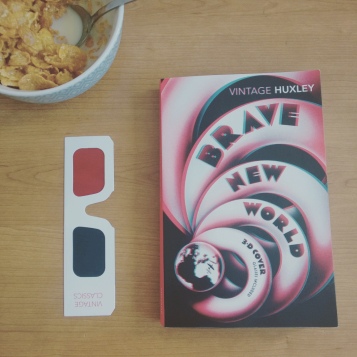This week’s book was ‘Brave New World’ by Aldous Huxley. A book I feel I should have read by now, but I find if things are put in front of me too much I tend to avoid them for something else.
Brave New World, to me, feels as relevant today as when it was published in 1932. In the way that it raises such controversial issues and subjects, it’s pretty crazy that this was written so long ago. Huxley was clearly ahead of his time, and the metaphorical landscape he sets for his ideas is so well thought out and constructed.
I found this one pretty easy to read, reading it in four days, which for 229 pages, plus lengthy introductions, a foreword, and a short biography of Huxley, at my reading speed is a mean feat. I was surprised at how I seemed to sail through it so swiftly, I think because given the subject and the heavy introductions which unwittingly prepared me for a heavy novel, I was expecting something more challenging.
I don’t think I read this so quickly and easily because this book and it’s ideas were any less heavy and complex than I was anticipating though. I think instead that Huxley’s style of writing feels so streamlined and pacy that it propelled me through at a rate of knots.
Brave New World follows Bernard and Lenina, citizens of the World State in 632 A.F. (After Ford), where embryos are duplicated in bottles to be either Deltas, Gammas, Epsilons, Betas, or Alphas, to create a systematic social hierarchy, of which as Alphas Bernard and Lenina are at the top. Lenina is completely content with the state of things in the world they inhabit: un-needing of human relationships, of hobbies, of interests, of love, of anger or dislike; disgusted by the idea of family, of parenthood; happy to be driven by promiscuity and to dope herself up on soma, a drug issued by the World State to be taken when a citizen feels any kind of extreme or ‘natural’ (in our sense of the word) emotion.
Bernard on the other hand, a psychologist, feels there is more to life than what they’ve been dictated, although he’s not sure what. He takes Lenina to the Reservation, where the natives live, love, are religious, build families, parent their children, etc. At first fascinated by this other world, Lenina soon becomes sickened by their customs and rituals and gives herself a ‘soma-holiday’ to take her away from reality until it’s time to leave. Her only solace is her meeting John, a native she has the hots for. Finding out that John is the illicit son of Bernard’s boss, when John’s mother Linda was made pregnant by him having come to the Reservation as a tourist, Bernard and Lenina return them to the World State, on which Linda is shunned as a freak, so different and ‘ugly’ in appearance and behaviour to them, whereas John is treated as an experiment.
John goes on to be shown around the ‘joint’ and the more he learns about civilisation the more he finds it to be disgraceful, and eventually begins to rebel and encourages others to join him, namely Bernard and Bernard’s friend Helmholtz – challenging the status quo, and resulting in Bernard and Helmholtz being sent to an island to live with others who have alternative ideas on how to live, whilst John retreats to an air-lighthouse in Puttenham where he gets back to his native rituals, namely of whipping himself and drinking warm water with mustard to rid him of his sins in being tempted by such a society. And as for Lenina, well…
I found it interesting how Huxley walks the line of what is/should be morally except-able and what isn’t, challenging the reader and their views of how they feel society should be. On the one hand, the conforming yet pleasure-filled society of the World State seems favourable for a moment, but then on the other hand, the freedom and dignity of the Reservation seems a more morally acceptable choice. Each have their pros and cons, and there seems to me to be no middle ground, it’s one or the other.
In today’s world where everything and anything is available at the click of a button, where billboards are becoming more and more sexualised…where everything is becoming more and more sexualised, Huxley’s prediction of the future is well on course to replicate a similar totalitarian yet moral-free society, which is as scary as all hell to think about. Spoiler alert: dystopia wins.
I’d reccommend Brave New World to anyone as a must read, particularly if you’re into dystopian fiction or sci-fi. Personally, I don’t read a lot of it, but occasionally I find a great dystopian novel like this one and enjoy getting lost in it.
Check back next week for my thoughts on book #11 of my ’52 Books in a Year’ challenge, ‘One Flew Over the Cuckoo’s Nest’ by Ken Kesey.
Looking for some new poetry to read? My book ‘Zygote Poems’ about my journey into fatherhood is available from Cultured Llama for a mere 5 pounds.

Another awesome book! The reservation idea is so interesting, these guys know.
Sent from my iPhone
>
It’s worth a read if you haven’t already 🙂